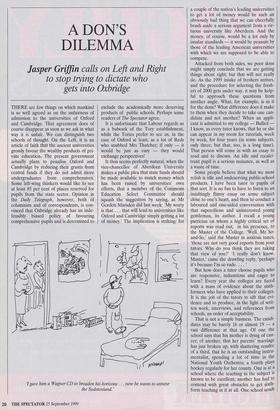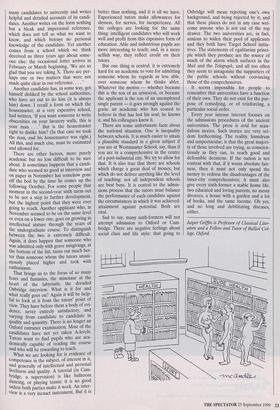A DON'S DILEMMA
Jasper Griffin calls on Left and Right
to stop trying to dictate who gets into Oxbridge
THERE are few things on which mankind is so well agreed as on the unfairness of admission to the universities of Oxford and Cambridge. That agreement does of course disappear as soon as we ask in what way it is unfair. We can distinguish two schools of thought. On the Left, it is an article of faith that the ancient universities grossly favour the wealthy products of pri- vate education. The present government actually plans to penalise Oxford and Cambridge by reducing their grants from central funds if they do not admit more undergraduates from comprehensives. Some left-wing thinkers would like to see at least 85 per cent of places reserved for pupils from the state sector. Opinion in the Daily Telegraph, however, both of columnists and of correspondents, is con- vinced that Oxbridge already has an inde- fensibly biased policy of favouring comprehensive pupils and is determined to exclude the academically more deserving products of public schools. Perhaps some readers of The Spectator agree.
It is unfortunate that Labour regards us as a bulwark of the Tory establishment, while the Tories prefer to see us, in the case of Oxford at least, as a lot of Reds who snubbed Mrs Thatcher; if only — it would be just as easy — they would exchange perspectives!
It thus seems perfectly natural, when the vice-chancellor of Aberdeen University makes a public plea that state funds should be made available to match money which has been raised by universities' own efforts, that a member of the Commons Education Select Committee should squash the suggestion by saying, as Mr Gordon Marsden did last week: 'My worry is that . . . that will lead to universities like Oxford and Cambridge simply getting a lot of money.' The implication is striking: for 7 gave him a Wagner CD to broaden his horizons . . now he wants to annexe the Sudetenland.' a couple of the nation's leading universities to get a lot of money would be such an obviously bad thing that we can cheerfully brush aside a serious argument from a vir- tuous university like Aberdeen. And the money, of course, would be a lot only by insular standards — it would be peanuts by those of the leading American universities with which we are supposed to be able to compete.
Attacked from both sides, we poor dons might simply conclude that we are getting things about right; but that will not really do. As the 1999 intake of freshers arrives, and the procedure for selecting the fresh- ers of 2000 gets under way, it may be help- ful to approach these questions from another angle. What, for example, is in it for the dons? What difference does it make to them when they decide to take one can- didate and not another? When an appli- cant is admitted to my college — Banjo!. I know, as every tutor knows, that he or she can appear in my room for tutorials, week by week, for four years (in some subjects, only three; but that, too, is a long time). That person will come in with an essay to read and to discuss. An idle and recalci- trant pupil is a serious nuisance, as well as a waste of time.
Some people believe that what we most relish is idle and undeserving public-school products. I have been tutor to pupils of that sort. It is no fun to have to listen to an insultingly flimsy essay on some subject close to one's heart, and then to conduct a laboured and one-sided conversation with that supercilious and uninterested young gentleman, its author. I recall a young patrician on whom a highly critical set of reports was read out, in his presence, to the Master of the College. 'Well, Mr So- and-So,' said the Master in anxious tones, `those are not very good reports from your tutors. Why do you think they are taking that view of you?' I really don't know, Master,' came the drawling reply, 'perhaps it's because I'm so rude. . . . '
But how does a tutor choose pupils who are responsive, industrious and eager to learn? Every year the colleges are faced with a mass of evidence about the sixth- formers who have applied to their colleges. It is the job of the tutors to sift that evi- dence and to produce, in the light of writ- ten work, interviews, and references from schools, an order of acceptability.
That is not a simple business. The candi- dates may be barely 16 or almost 19 — a vast difference at that age. Of one the school says that his mother is dying of can- cer; of another, that her parents' marriage has just broken up, with shattering results; of a third, that he is an outstanding instru- mentalist, spending a lot of time in the National Youth Orchestra; a fourth plays hockey regularly for her county. One is at a school where the teaching in the subject is known to be excellent; another has had to contend with great obstacles to get sixth- form teaching in it at all. One school sends many candidates to university and writes helpful and detailed accounts of its candi- dates. Another writes on the form nothing but a bleak and impersonal reference, which does not tell us what we want to know, and which betrays no personal knowledge of the candidate. Yet another comes from a school which we think deceived us three years ago about some- one else: the occasional letter arrives in February or March beginning, 'We are so glad that you are taking X. There are per- haps one or two matters that were not made quite clear in our reference. . . . ' Another candidate has, in some way, got himself disliked by the school authorities, who have set out to do him (it is always him) down. I recall a form on which the housemaster, at a very expensive school, had written, 'If you want someone to write obscenities on your lavatory walls, this is your man. . . . ' But is the housemaster right to dislike him? (In that case we took the man, and his housemaster was right.) All this, and much else, must be estimated and allowed for.
There are other factors, more purely academic but no less difficult to be sure about. It sometimes happens that a candi- date who seemed so good at interview and on paper in November has somehow gone off the boil by the time he comes up the following October. For some people that moment in the second-year sixth turns out to be not a step to further development, but the highest point that they were ever going to reach. Another applicant who, in November seemed to be on the same level or even on a lower one, goes on growing in intellectual stature through the years of the undergraduate course. To distinguish between the two is extremely difficult. Again, it does happen that someone who was admitted only with grave misgivings, at the bottom of the list, turns out much bet- ter than someone whom the tutors unani- mously placed higher and took with enthusiasm.
That brings us to the focus of so many fears and fantasies, the minotaur at the heart of the labyrinth: the dreaded Oxbridge interview. What is it for and what really goes on? Again it will be help- ful to look at it from the tutors' point of view. They have before them a body of evi- dence, never entirely satisfactory, and varying from candidate to candidate in quality and quantity. There is no longer an Oxford entrance examination. Most of the candidates have not yet taken A-levels. Tutors want to find pupils who are aca- demically capable of reading the course and who will be rewarding to teach. What we are looking for is evidence of competence in the subject, of interest in it, and generally of intellectual and personal liveliness and quality. A tutorial (in Cam- bridge, a supervision) is like ballroom dancing, or playing tennis: it is no good unless both parties make it work. An inter- view is a very inexact instrument. But it is better than nothing, and it is all we have. Experienced tutors make allowances for shyness, for nerves, for inexperience. All the colleges are looking for the same thing: intelligent candidates who will work well and profit from this expensive form of education. Able and industrious pupils are more interesting to teach; and, in a more selfish way, they reflect credit on their tutors.
But one thing is central: it is extremely hard for an academic to vote for admitting someone whom he regards as less able, over someone whom he thinks abler. Whatever the motive — whether because this is the son of an aristocrat, or because the applicant is the son of an unemployed single parent — it goes strongly against the grain: an academic who has ceased to believe in that has lost his soul; he knows it, and his colleagues know it.
There are some unfortunate facts about the national situation. One is inequality between schools. It is much easier to attain a plausible standard in a given subject if you are at Westminster School, say, than if you are in a comprehensive in the centre of a post-industrial city. We try to allow for that. It is also true that there are schools which charge a great deal of money, but which do not deliver anything like the level of teaching: not all independent schools are best buys. It is central to the admis- sions process that the tutors must balance the performance of each candidate against the circumstances in which it was achieved: attainment against potential. Both are vital.
Sad to say, many sixth-formers will not attempt admission to Oxford or Cam- bridge. There are negative feelings about social class and life style: that going to Oxbridge will mean rejecting one's own background, and being rejected by it; and that these places do not in any case wel- come anyone who is not out of the top drawer. The two universities are, in fact, anxious to widen their pool of applicants and they both have Target School initia- tives. The statements of egalitarian princi- ple which they produce are the source of much of the alarm which surfaces in the Mail and the Telegraph, and all too often they seem to antagonise the supporters of the public schools without convincing those of the comprehensives.
It seems impossible for people to remember that universities have a function of their own. They do not exist for the pur- pose of remedying, or of reinforcing, a particular social order.
Every year intense interest focuses on the admissions procedures of the ancient universities. The press is avid for scan- dalous stories. Such stories are very sel- dom forthcoming. The reality, humdrum and unspectacular, is that the great majori- ty of those involved are trying, as conscien- tiously as they can, to reach good and defensible decisions. If the nation is not content with that, if it wants absolute fair- ness, then it must not only spend the money to redress the disadvantages of the inner-city comprehensives; it must also give every sixth-former a stable home life, two educated and loving parents, no messy divorces, a house with a garden and a lot of books, and the same income. Oh yes, and no long and debilitating diseases, either.
Jasper Griffin is Professor of Classical Liter- ature and a Fellow and Tutor of Balliol Col- lege, Oxford.



























































































 Previous page
Previous page